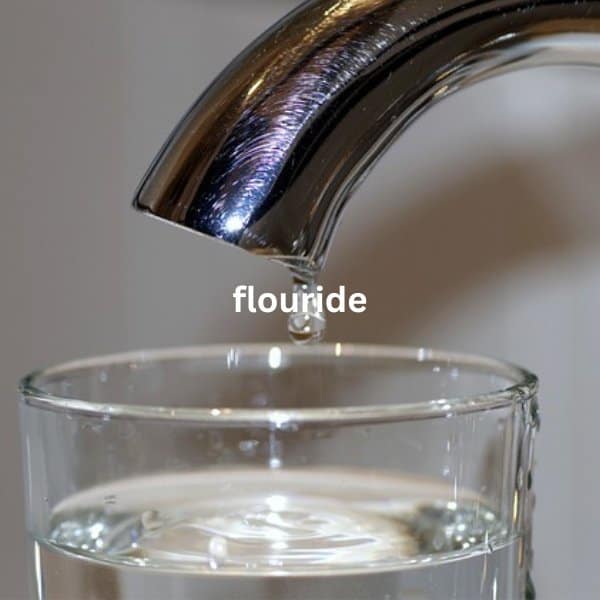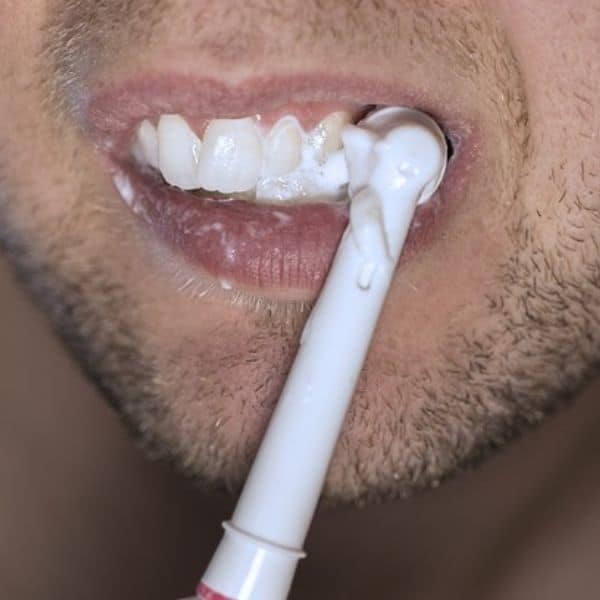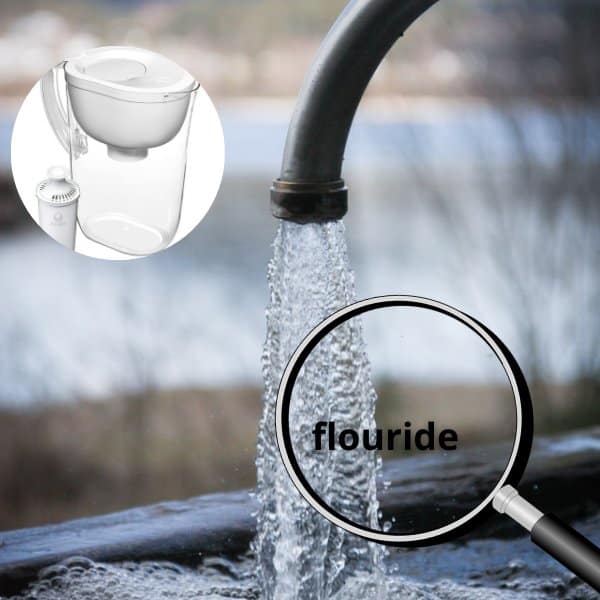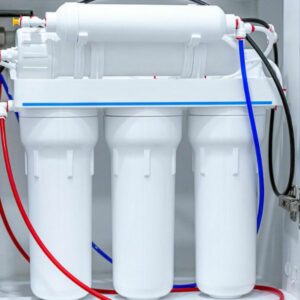Can Brita Filters Remove Fluoride?
Brita pitcher filters have become a popular method for filtering tap water, but do Brita filters remove fluoride? The answer is NO. Brita claims that their filters do not filter fluoride as this mineral is crucial for healthy teeth.
Reasons Why Brita Filters Cannot Remove Fluoride
For one thing, Brita filters use a combination of a granulated activated carbon filter and ion exchange resin which is not so effective in removing fluoride from water. Other reasons are outlined below.
Fluoride is hard to remove
Removing fluoride is hard from drinking water. One possible reason is its high reactivity which easily reacts with other molecules. For this reason, only a few purification methods are effective in removing this mineral from water.
Processes such as reverse osmosis, distillation, and activated alumina can remove fluoride.
Carbon filters cannot remove fluoride
Brita filters use activated carbon filters to remove contaminants from drinking water. Loose granules of activated carbon absorb chlorine, zinc, copper, and cadmium. However, these types of filters do not remove fluoride.

Health Risks of Too Much Fluoride
Fluoride can lead to numerous health risks for both adults and children.
Teeth and Bone Diseases
Fluoride is an essential mineral that’s found naturally in most water sources. It can help strengthen teeth and bones. However, too much fluoride can lead to serious health issues.
Dental Fluorosis
Exposure to excessively fluoridated water has been linked to dental fluorosis, a condition in which tooth enamel becomes discolored or mottled. This condition primarily affects children exposed to large amounts of fluoride during their tooth-forming years of life.
Skeletal Fluorosis
Research has suggested that long-term exposure to high fluoride levels may also increase the risk for skeletal fluorosis, a painful bone disorder characterized by joint pain and stiffness throughout the body.
Skeletal fluorosis can affect a person’s quality of life due to the physical limitations it brings about.

Thyroid Problems
High levels of fluoride can damage the thyroid gland and interfere with the production of thyroid hormones which are responsible for regulating metabolism and other important bodily functions. One thyroid problem is hyperthyroidism, with symptoms such as weight gain, muscle cramps, constipation, and tiredness. In very rare cases, untreated hyperthyroidism can cause myxoedema coma —a life-threatening emergency.
Neurological Problems
High levels of fluoride exposure have been linked to neurological problems such as impaired intelligence quotient (IQ), attention and memory deficits, delayed motor development, and altered behavior. Studies have indicated that excessive fluoride can reduce cognitive abilities by altering the thyroid hormones that regulate brain development during fetal and postnatal life.
Additionally, long-term overexposure to high levels of fluoride can induce serious oxidative damage in certain areas of the brain which may lead to further impairment in intellectual abilities.
Fluoride Poisoning
Fluoride poisoning, also known as fluorosis, occurs when ingestion of high concentrations of fluoride leads to adverse health effects. Symptoms of fluoride poisoning include nausea and vomiting, stomach pain, diarrhea, muscle weakness, and difficulty breathing. In severe cases, it can lead to convulsions or even death.
Other Health Issues
Fluoride has also been linked to a variety of other health issues, including:
- Cancer and tumors
- Increased lead absorption
- Disruptions to the central nervous system (CNS)

How to Test Water for Fluoride?
Testing your water for fluoride levels is easy with the right tools and methods.
Use a Water Test Kit
A water testing kit allows you to test your tap water for a variety of common contaminants. It’s simple, easy to use, and costs far less.
Have your water tested by a state certified-laboratory
Another way to test the fluoride levels in your water is to have it tested by a state certified-laboratory. This method can be costly and timely, but it offers more accurate results and peace of mind.
What Contaminants Do Brita Filters Remove?
Brita removes common water contaminants in water. However, Brita recommends not to use untreated source water as it can affect the filtration performance of their product.
Following are the contaminants that each type of Brita filter removes:
Standard Filter
The Standard Brita Filters remove chlorine, zinc, copper, and cadmium from tap water. This makes them effective for improving taste and odor, but they do not reduce lead levels or other contaminants found in some public water systems.
Elite Filter (Longlast Filter)
The Elite Filter takes the Standard Filter one step further by removing more contaminants like lead, asbestos, and even pharmaceutical residues like ibuprofen and naproxen. Brita Elite filters also remove the following water contaminants:
- Pesticides and Herbicides (e.g. Atrazine, Endrin)
- Volatile organic compounds (e.g. Benzene, p-Dichlorobenzene (PDCB)
- Sediments (particulates of 0.5 to 1 micron)
Click here to view the complete list of contaminants Brita Elite filters remove from the source water.
Stream Filter
The Brita Stream Filter features a dual layer of industry-secret filtration technology. It effectively reduces a 1,2,4 Trichlorobenzene- a type of volatile organic compound (VOC), Particulate (Class VI) coarse particulates of more than 50 micrometers as stated on its performance data sheet. It also reduces chlorine taste and odor.

Water Filters That Can Remove Fluoride
The following water filters remove lead, arsenic, and fluoride. Some may also remove other contaminants such as disinfection byproducts (DBPs), pesticides, herbicides, and volatile organic compounds (VOCs).
Clearly Filtered Water Filter Pitcher
Clearly Filtered water filter pitcher uses a combination of a unique physical structure and a magnet-like chemical absorption to remove contaminants from the source water effectively. These tiny magnets can recognize the ionic signature of water contaminants, attracts them, and then binds them, keeping them away from the water.
As seen in their performance data sheet, Clearly Filtered water filter pitchers can remove more than 365 water contaminants including. This includes perfluorinated chemicals, microplastics, haloacetic acids, phthalates, and radiological elements. Specifically, it has a fluoride removal rate of 99.5%.
Epic Pure Water Filter Pitcher
Epic Pure Water Filter relies on a carbon block filter thanks to its compact design and bigger filter surface area. Its structure allows for more contact time with water so more contaminants adhere to the carbon removing them from your drinking water.
Based on its performance data sheet, it can remove over 200 contaminants, including heavy metals, microplastics, and radiological elements. Its fluoride removal rate is 97.88%.
Waterdrop Chubby 10-cup Water Purifier Pitcher
Waterdrop Water Purifier Pitchers rely on an activated carbon filter and employ multistage filtration processes to filter out chlorine taste and odor, limescale, and heavy metals such as lead, mercury, and cadmium.
Although tests are not available on their website, the Waterdrop Chubby water filter can greatly reduce 98% of fluoride in water based on a product review.
Conclusion
Brita filters do not remove fluoride in tap water. Too much fluoride in drinking water is harmful and can cause many diseases such as brittle bones, cancerous tumors, joint pain (arthritis), and brittle teeth.
Furthermore, other purification methods such as reverse osmosis and distillation, can remove fluoride efficiently. Therefore, it is important to research the options available and choose the best filtration system according to your needs.

